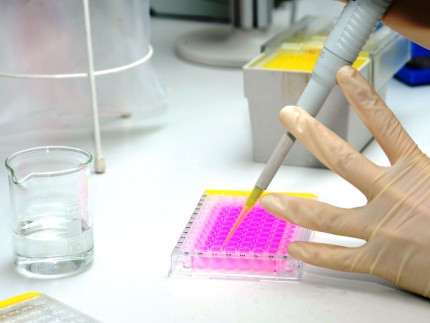Posttranslational protein modifications
Background
Posttranslational protein modifications (PTPMs) are an important metabolic instrument to modulate and regulate the structure, function and activity of proteins. By now more than 300 different PTPMs were described, whereby phosphorylation, acetylation, glycosylation and ubiquitination are the most frequently considered forms. But also oxidative PTPM are of central importance for the regulation of the protein function and the metabolism and are hence a significant element of the department’s research.
Research
Our research is mainly focused on the homotetrameric, visceral protein transthyretin (TTR), which is an excellent model to analyze oxidative PTPMs in the area of nutritional science and medicine due to its structure (reactive cysteine residue in each subunit, non-covalent binding of the subunits) and metabolic function (biomarker for the nutrition status, body composition). Furthermore the rather low molecular weight of the TTR subunits (ca. 14 kDa) enables the analysis of the intact protein and therefore simplifies the consideration of protein-protein and protein-ligand interactions.
Within our research, changes of the PTPM pattern of TTR and their significance for the prevention, prognosis and therapy under special consideration of nephrological and endocrinological diseases are analyzed. In this context also the suitability of TTR as a biomarker for pharmacological analyses is being evaluated. Furthermore the influence of different PTPMs on the function of TTR as transport protein for the thyroid hormones and vitamin A as well as the property of TTR as protease are considered.
Next to oxidative PTPMs the department also takes into account the diagnostic potential of protein carbamylation (TTR and serum albumin) and posttranslational protein truncations (especially retinol binding protein 4).
For the analysis of the PTPMs we apply a combination of different methods including electrophoresis, enzymatic digestion, immunoprecipitation, MALDI-TOF-MS and HPLC.
Literature
- Henze et al: Post-translational modifications of transthyretin affect the triiodonine-binding potential. J Cell Mol Med. 2015 Feb;19(2):359-70.
- Henze et al: Does N-acetylcysteine modulate post-translational modifications of transthyretin in hemodialysis patients? Antiox Redox Signal. 2013 Oct;19(11):1166-72.
- Henze et al: Alterations of retinol-binding protein 4 species in patients with different stages of chronic kidney disease and their relation to lipid parameters. Biochem Biophys Res Comm. 2010 Feb;393(1):79-83.
- Henze et al: Structural modifications of serum transthyretin in rats during protein-energy malnutrition. Rapid Commun Mass Spectrom. 2008 Oct;22(20):3270-4.
- Frey et al: Effect of renal replacement therapy on retinol-binding protein 4 isoforms. Clin Chim Acta. 2009 Mar;401(1-2):46-50.
- Frey et al: Isoforms of retinol binding protein 4 (RBP4) are increased in chronic diseases of the kidney but not of the liver. Lipids Health Dis. 2008 Aug;7:29.
- Frey et al: Factors that influence retinol-binding protein 4-transthyretin interaction are not altered in overweight subjects and overweight subjects with type 2 diabetes mellitus. Metabolism. 2009 Oct;58(10):1386-92

